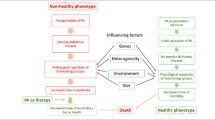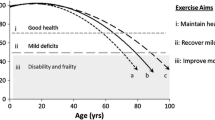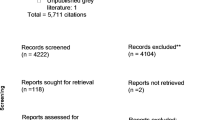Abstract
Promoting physical activity (PA) is of top priority in chronic obstructive pulmonary disease (COPD). This study examines the influence of an internet-delivered intervention on the relationship between exercise self-efficacy and changes in PA, physical health, and exercise capacity in COPD. 112 U.S. Veterans with COPD were randomized to either a comparison (pedometer alone) or an intervention group (pedometer plus access to an internet-mediated PA intervention). There was a significant interaction between baseline exercise self-efficacy and randomization group on change in PA. In the comparison group, there was a significant relationship between higher baseline exercise self-efficacy and greater change in PA, whereas in the intervention group, improvements in PA were independent of level of baseline self-efficacy. Similar patterns were found with physical health and exercise capacity as outcomes. The use of an internet-mediated intervention significantly benefited persons with COPD who had low baseline self-efficacy to increase PA and physical health.
Clinical trial registration The randomized clinical trial was registered on ClinicalTrials.gov (NCT01772082).


Similar content being viewed by others
References
American Thoracic Society. (2002). ATS statement: Guidelines for the six-minute walk test. American Journal of Respiratory and Critical Care Medicine, 166, 111–117. https://doi.org/10.1164/ajrccm.166.1.at1102
Bandura, A. (1986). The explanatory and predictive scope of self-efficacy theory. Journal of Social and Clinical Psychology, 4, 359–373.
Bandura, A. (2004). Health promotion by social cognitive means. Health Education & Behavior, 31, 143–164.
Cindy Ng, L. W., Mackney, J., Jenkins, S., & Hill, K. (2012). Does exercise training change physical activity in people with COPD? A systematic review and meta-analysis. Chronic Respiratory Disease, 9, 17–26.
Danilack, V. A., Weston, N. A., Richardson, C. R., Mori, D. L., & Moy, M. L. (2014). Reasons persons with COPD do not walk and relationship with daily step count. COPD, 11, 290–299. https://doi.org/10.3109/15412555.2013.841670
Davis, A. H., Figueredo, A. J., Fahy, B. F., & Rawiworrakul, T. (2007). Reliability and validity of the Exercise Self-Regulatory Efficacy Scale for individuals with chronic obstructive pulmonary disease. Heart & Lung: The Journal of Acute and Critical Care, 36, 205–216.
Gwaltney, C. J., Metrik, J., Kahler, C. W., & Shiffman, S. (2009). Self-efficacy and smoking cessation: A meta-analysis. Psychology of Addictive Behaviors: Journal of the Society of Psychologists in Addictive Behaviors, 23, 56–66. https://doi.org/10.1037/a0013529
Kazis, L. E., Miller, D. R., Clark, J. A., Skinner, K. M., Lee, A., Ren, X. S., et al. (2004). Improving the response choices on the veterans SF-36 health survey role functioning scales: Results from the Veterans Health Study. The Journal of Ambulatory Care Management, 27, 263–280.
Lewis, B. A., Napolitano, M. A., Buman, M. P., Williams, D. M., & Nigg, C. R. (2017). Future directions in physical activity intervention research: Expanding our focus to sedentary behaviors, technology, and dissemination. Journal of Behavioral Medicine, 40, 112–126. https://doi.org/10.1007/s10865-016-9797-8
Luszczynska, A., Schwarzer, R., Lippke, S., & Mazurkiewicz, M. (2011). Self-efficacy as a moderator of the planning–behaviour relationship in interventions designed to promote physical activity. Psychology and Health, 26, 151–166. https://doi.org/10.1080/08870446.2011.531571
McAuley, E., & Blissmer, B. (2000). Self-efficacy determinants and consequences of physical activity. Exercise and Sport Sciences Reviews, 28, 85–88.
McAuley, E., Szabo, A., Gothe, N., & Olson, E. A. (2011). Self-efficacy: Implications for physical activity, function, and functional limitations in older adults. American Journal of Lifestyle Medicine, 5, 361–369. https://doi.org/10.1177/1559827610392704
Miller, M. R., Hankinson, J., Brusasco, V., Burgos, F., Casaburi, R., Coates, A., et al. (2005). Standardisation of spirometry. European Respiratory Journal, 26, 319–338.
Moy, M. L., Collins, R. J., Martinez, C. H., Kadri, R., Roman, P., Holleman, R. G., et al. (2015). An internet-mediated pedometer-based program improves health-related quality-of-life domains and daily step counts in COPD: A randomized controlled trial. Chest, 148, 128–137. https://doi.org/10.1378/chest.14-1466
Moy, M. L., Gould, M. K., Liu, I. A., Lee, J. S., & Nguyen, H. Q. (2016). Physical activity assessed in routine care predicts mortality after a COPD hospitalisation. ERJ Open Research, 2, 00062. https://doi.org/10.1183/23120541.00062-2015
Moy, M. L., Teylan, M., Weston, N. A., Gagnon, D. R., & Garshick, E. (2013). Daily step count predicts acute exacerbations in a US cohort with COPD. PLoS ONE, 8, e60400. https://doi.org/10.1371/journal.pone.0060400
Murray, T. C., Rodgers, W. M., & Fraser, S. N. (2012). Exploring the relationship between socioeconomic status, control beliefs and exercise behavior: A multiple mediator model. Journal of Behavioral Medicine, 35, 63–73.
Nakahara, R., Yoshiuchi, K., Kumano, H., Hara, Y., Suematsu, H., & Kuboki, T. (2006). Prospective study on influence of psychosocial factors on glycemic control in Japanese patients with type 2 diabetes. Psychosomatics, 47, 240–246.
Nguyen, H. Q., Chu, L., Amy Liu, I. L., Lee, J. S., Suh, D., Korotzer, B., et al. (2014). Associations between physical activity and 30-day readmission risk in chronic obstructive pulmonary disease. Annals of the American Thoracic Society, 11, 695–705.
Robinson, S. A., Bisson, A. N., Hughes, M. L., Ebert, J., & Lachman, M. E. (2018). Time for change: Using implementation intentions to promote physical activity in a randomised pilot trial. Psychology and Health, 34, 232–254. https://doi.org/10.1080/08870446.2018.1539487
Vogelmeier, C. F., Criner, G. J., Martinez, F. J., Anzueto, A., Barnes, P. J., Bourbeau, J., et al. (2017). Global strategy for the diagnosis, management, and prevention of chronic obstructive lung disease 2017 report. GOLD Executive Summary. American Journal of Respiratory and Critical Care Medicine, 195, 557–582. https://doi.org/10.1164/rccm.201701-0218pp
Wan, E. S., Kantorowski, A., Homsy, D., Teylan, M., Kadri, R., Richardson, C. R., et al. (2017). Promoting physical activity in COPD: Insights from a randomized trial of a web-based intervention and pedometer use. Respiratory Medicine, 130, 102–110. https://doi.org/10.1016/j.rmed.2017.07.057
Ware, J. E., Jr., & Sherbourne, C. D. (1992). The MOS 36-item short-form health survey (SF-36): I. Conceptual framework and item selection. Medical Care, 30, 473–483.
Watz, H., Pitta, F., Rochester, C. L., Garcia-Aymerich, J., ZuWallack, R., Troosters, T., et al. (2014). An official European Respiratory Society statement on physical activity in COPD. European Respiratory Journal, 44, 1521–1537.
Acknowledgements
We thank the Veterans who participated in this study. The views expressed in this article do not communicate an official position of the Department of Veterans Affairs.
Funding
This study was funded by the Department of Veterans Affairs, Rehabilitation Research and Development Service [Career Development Award 2, F6847W (Moy); CDA2 IK2RX002165 (Wan); Merit O1150-R (Moy)], and the Department of Veterans Affairs Office of Academic Affiliations Advanced Fellowship Program in Health Services Research, the Center for Healthcare Organization and Implementation Research (CHOIR), Edith Nourse Rogers Memorial Veterans Hospital (Robinson).
Author information
Authors and Affiliations
Corresponding author
Ethics declarations
Conflict of interest
Stephanie A. Robinson, Stephanie L. Shimada, Karen S. Quigley, and Marilyn L. Moy declare they have no conflict of interest.
Human and animal rights and Informed consent
All procedures performed in studies involving human participants were in accordance with the ethical standards of the institutional and/or national research committee and with the 1964 Helsinki declaration and its later amendments or comparable ethical standards. Informed consent was obtained from all patients for being included in the study.
Additional information
Publisher's Note
Springer Nature remains neutral with regard to jurisdictional claims in published maps and institutional affiliations.
Rights and permissions
About this article
Cite this article
Robinson, S.A., Shimada, S.L., Quigley, K.S. et al. A web-based physical activity intervention benefits persons with low self-efficacy in COPD: results from a randomized controlled trial. J Behav Med 42, 1082–1090 (2019). https://doi.org/10.1007/s10865-019-00042-3
Received:
Accepted:
Published:
Issue Date:
DOI: https://doi.org/10.1007/s10865-019-00042-3




